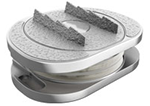The Disc Replacement Book
By Jim Rider
Disc Replacement FAQ
IS DISC REPLACEMENT RIGHT FOR ME?
Disc replacement is not for everyone. As you have read, not everyone is a good candidate for the procedure. Yet the truth of the matter is that most people suffering from degenerative disc disease, post-discectomy or post-discotomy syndrome, and other conditions can benefit from disc replacement in a profound and positive way. Many people who receive spinal fusions could instead have full function of the spine restored through disc replacement. And those who already have fusions in place may benefit from disc replacement if they start to have problems at adjacent levels (Adjacent Level Syndrome).
But what about you? Is this the best solution for you?
First, I want to offer you the opportunity to have me and my team personally evaluate your condition. Our team of surgeons has performed thousands of disc replacement procedures. We know what to look for, and we know the proper indications for disc replacement or, if needed, hybrid intervention. We also have an excellent protocol for evaluating patients remotely and have been doing this for more than 10 years.
Then, discuss disc replacement with your personal physician. Provided that he or she is familiar with your spine, input from your physician is very important. If your physician is unfamiliar with disc replacement, then give him or her a copy of this book.
SHOULD I PUT OFF DISC REPLACEMENT?
Many people who have been told they should have spinal fusion have also been told they should put such fusion off as long as possible. It is not uncommon for patients to be told they should simply live with their pain until they cannot stand it any longer, and then get fusion. This has come about because we know, over time, spinal fusion at one level will cause increased stress and degeneration at adjacent levels. Eventually, those adjacent levels may require fusion. Therefore, there are disadvantages to having fusion early rather than late.
The same discussion occurs around knee and hip replacements, where such implants have a limited lifespan before they may have to be resected or redone.
Fortunately, this problem does not exist for most artificial disc devices. Because of the incredible durability of the implants, we know that a single implant will last a patient for the rest of his or her life. As a result, there is no advantage to putting off disc replacement in most circumstances. There are limited situations where a surgeon may want to delay surgery to get other conditions and factors under control, but there is otherwise no advantage to putting off surgery. On the contrary, there are some instances where delay can be problematic, particularly if the delay allows the underlying disease to progress so far that it damages the integrity of the vertebrae.
In addition, the longer the nerves are impinged often means that recovery may be more difficult, or more limited. And, the longer you wait for surgery, the more deconditioned your muscles and other structures may become. Sadly, poor conditioning can cause a mediocre or poor result from an otherwise excellent surgery. For these reasons, if you are a candidate for surgery, consider getting it done as soon as reasonable. At the very least, explore your options now and have a frank discussion with your surgeon about the pros and cons of waiting for surgery. You may find that surgery in the near future may serve you better.
HOW LONG WILL AN ARTIFICIAL DISC LAST?
Most artificial disc implants are engineered to last for a very long time. The protocol for FDA certification in the U.S. requires the device to last for at least ten million cycles. For example, the ProDisc-C (Cervical) has been tested to ten million cycles (Synthes, 2011). The M6 device has been tested to more than 30 million cycles, after which the disc was still completely functional and within normal limits of motion and function. This means the M6 implant is expected to last for 60-75 years before suffering significant wear. Incidentally, this is far more durable than human discs, most of which begin to deteriorate after only 20-30 years of life.
If you undergo disc replacement, you should never need to have that disc replaced in normal circumstances. Unlike some other joint implants, where we can predict that another replacement or resection will be needed in 10-20 years, a quality artificial disc should last a lifetime. Given the construction materials and techniques, modern disc implants should never need to be replaced or removed.
WHAT DOES DISC REPLACEMENT SURGERY COST?
The cost of disc replacement is a common concern for many patients. And with the advent of medical tourism, more and more people are researching their options as they seek out the best surgical team and the best devices from around the world. While the price of surgery should never be the primary factor in these decisions, it is a factor after all. However, the cost of not having ADR surgery is worth discussing.
Back pain costs society an enormous amount of money. The World Health Organization estimates that back pain costs the Unites States alone 100 to 200 billion dollars each year! (WHO, 2004) But those who experience back pain firsthand (and those that live and work with them) know the cost is far greater. The cost to relationships, at work and at home, can be devastating. How can we place a value on the ability of a father to support his family? Or a mother to lift her child? Simply put, we cannot. These factors, though more subjective than the money paid for medical care or the compensation lost due to time off work, are ultimately without price…or priceless.
Next Chapter – Disc Replacement Surgeons > >
The Disc Replacement Book – A Back in Motion
By Jim Rider
